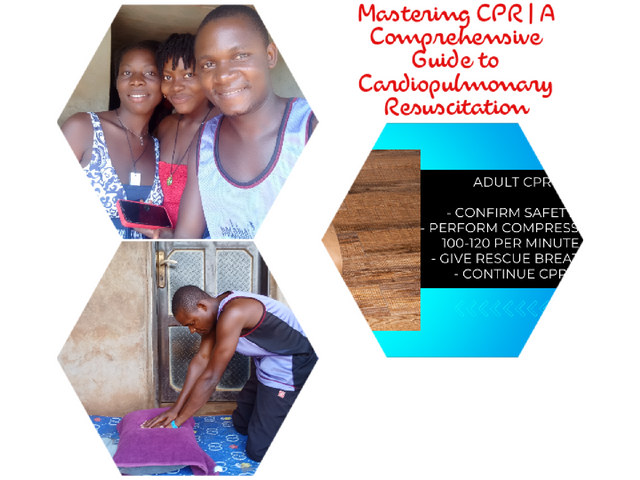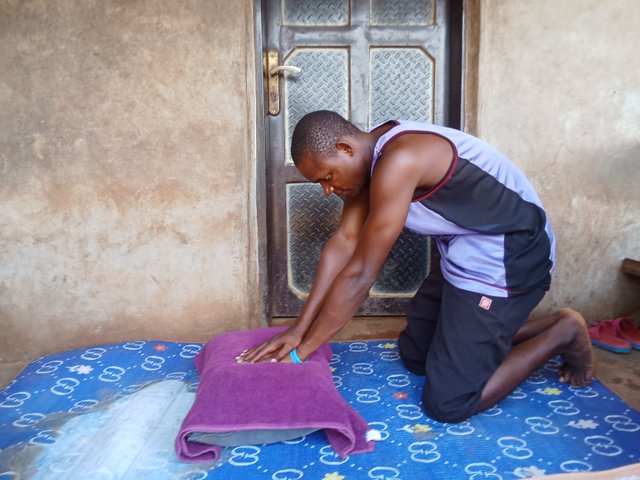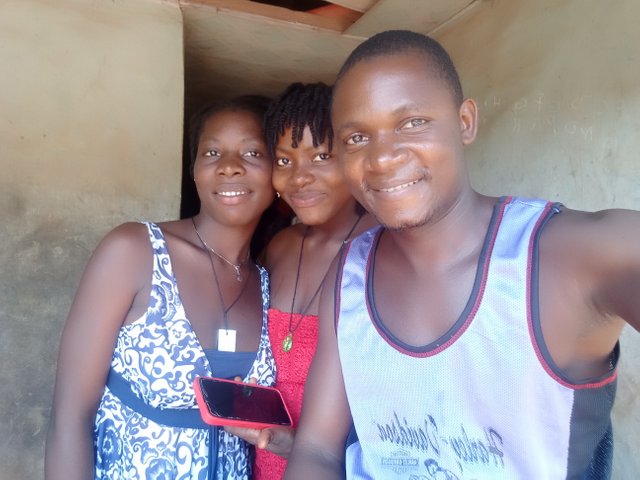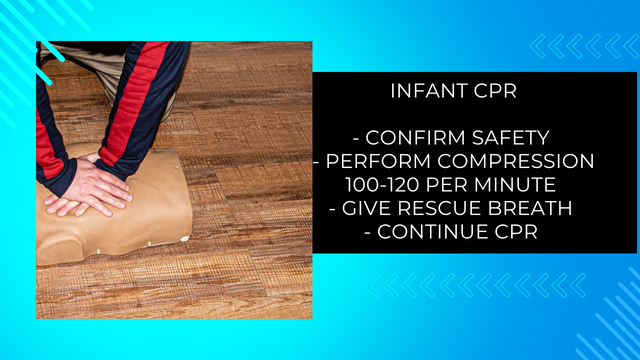SLC21/WK2: Mastering CPR | A Comprehensive Guide to Cardiopulmonary Resuscitation
Greetings dear friends, it's the first week of the Steemit Learning Challenge and I'm delighted to share my participation in the contest organised here by this teaching team which they titled Mastering CPR | A Comprehensive Guide to Cardiopulmonary Resuscitation. Going through the course material I noticed that it is knowledge packed and interesting and for that reason I will like to share my thought based on the questions given below.

| Perform all steps of cpr on a mannequin (your productivity) and explain each and every step in detail. Teach CPR to only 3 people (may it be your family, friends, relatives, or fellow mates and attach pictures of you teaching them) (Edited- if you don’t have a mannequin, use a firm pillow or stack of towels) |
|---|
The first thing to do before I started my CPR was to get myself and the mannequin to safety. Safety is important because before saving a life you must also ensure that you yourself is safe and the patient is not open to more danger. I'm assuming this mannequin is an adult hence I firstly check for breathing and I noticed that there was no response from the mannequin implying that there is no breathing.
I hurridly called the mob stand beside to call for emergency backup while I went ahead to start the CPR. To effectively carry out the CPR, I knelt down right beside the mannequin, I placed my right hand on the chest of the mannequin with the left hand interlocking and the heel of the hand is below the breast bone.

I was at balance when I did all that because I don't want to get tired when I start the compression. Seeing that I was completely balance I started the compression and then I counted aloud so that I don't miss out the count. As discussed in the lecture the count recommended was either 100 or 120 per minutes.
While I was carrying out the CPR, I still took into account my DRABC protocol. Here what I did was to check and be sure that nothing was blocking the airways restricting free airflow. Because if there is a blockage then it will be difficult for the patient to regain consciousness. I also ensured that I tilt the head and chin to a particular direction to allow free airflow.
Another thing I consider doing if the person doesn't respond is to do mouth to mouth respiration. Here I consider that the victim doesn't have any form of sickness or things coming out from his mouth and since the compression didn't work I immediately use my mouth to pass air into him. Though this can be consider as the first thing to do if the patient has no signs or symptoms of illness as it works faster except for severe conditions then compression can be done.
The image below is the image of myself teaching CPR to my siblings. They are so fascinated about the lecture and the knowledge because they never knew that there are different ways which CPR can be carried based on the age and the conditions of the patient.

Educating them on these was something they confirmed that they have learnt a lot from. So this means that i have also helped through this course to impact a knowledge which they can use to save a soul.
| How to perform CPR on pregnant lady, obese people and weak elder people, write modifiable procedures for each in detail. |
|---|
To perform CPR on pregnant lady, obese people and weak elderly people, let's consider the procedure in the table below as all these person have different ways on which CPR can be carried out.
| Modification | Pregnant lady | Obese | Weak Elderly |
|---|---|---|---|
| Access scene and check for responsiveness | Here you do same to all three i.e secure yourself and the patient | do same thing as for pregnant lady | do same thing as for pregnant lady |
| Positioning | Placed with back on ground on smooth surface with legs elevated | Placed with back on ground on smooth surface | Placed with back on ground on smooth surface with a pillow to support their head |
| Chest Compressions | 2-inch compression recoil protocol to be used | 3-inch compression recoil protocol to be used | Mild compression recoil protocol to be used less than 2-inch |
| Breathing | Check chest rise and be sure to see 2 breath per second | Check chest rise and be sure to see 2 breath per second and much pressure | Check chest rise and be sure to see 2 breath per second and low pressure |
| Airways | Check for airways by tilting the head and tapping the chick | Check for airways by tilting the head and tapping the chick | Check for airways by tilting the head and tapping the chick |
| Write explanation for all the mistakes people do during CPR, aswe highlighted in the class topic. |
|---|
In truth there are many mistakes done when carrying out CPR and these mistakes are what I will be highlighting here for your information. Before I go ahead there is a movie I watched recently and a CPR was carried out on a little child so a mob standing by who happens to be a doctor said you are killing the child.
The person carrying out the CPR said no he was trying to revive the child then the mob said it could have be right if you are doing that to an adult but as a kid the pressure and the positioning is causing more harm to him than good. That was when I knew that it is not enough to carry out CPR but carrying it out the right way matters a lot. So based on the lecture and my little knowledge I will be explaining a few ways in which people do mistake while carrying out CPR.
Compression of the chest inadequately is one of the major mistakes done during CPR. People don't often know when and how to place there hands and the pressure to put depending on the age and strength of the individual and that is a big problem we have.
The rate of pressure & speed that must be applied as explained on my story above. People sometimes end up killing the individual based on the pressure the exact. Based on recommendation we are to work on the speed of 100 - 120 per minutes but sometimes we may be too fast or too slow which may result to another issue.
When the person performing the CPR decides to stop because he noticed a little movement in the patient. He is supposed to continue this until the patient recover fully.
Stopping the process of CPR because you are tired and this is as a result of wrong positioning. When you don't stay well before staring CPR then you will get fatigued on time and then may not be able to do the needful.
Wrong counting or not counting at all which will make you loss focus on the task you are working on as a rescurer.
| Plan a simple campaign to raise awareness about CPR in your community. Write down the main goal of your campaign, who you want to reach (your target audience), and key messages you want to share. Think about how you can spread the word (like using social media or holding a community event). Your plan should be clear and include a basic timeline showing when you will do each part of the campaign. (You only have to devise a working plan and not practically implement it.) |
|---|
In this section, I will be sharing with you all my Campaign Goal, My Target Audience, Key Messages and Campaign Strategy.
Title: CPR Awareness to All
Campaign Goal: Everyone should know how to save life using CPR
Target Audience: Adults from age 18, all health workers and parents.
Key Messages: What is CPR?, How to effectively carry out CPR? Mistakes done during CPR. Who can carry out CPR?
Campaign Strategy: To achieve these and reach a wider audience what I will do is to firstly have a plan on how long the programme will take and also have a designed plan.
Now below is my designed plan which will be a 1 month program. In week 1, I will focus on creating awareness and publicity i.e., going to social media such Facebook, Instagram and tick-tock where I have followers to share the announcement of the program which will be holding in the set date.
In week 2, social media publicity continuous while I also go and meet people within the community to ensure that those who are not online get to know about the upcoming event. I will try to get a fliers ready and also share it with them. This will keep their mind upto date as regard the program.
In the week 3, I will repeat all of week 1 and week 2 task again and to add to it I will get the equipment and the venue for the program ready and all necessary material needed to that the place will be conducive to anyone coming for the event.
In week 4 we go straight into the main thing where I will discuss all the messages I have shared with you above and then people are free to also make enquiries and ask questions as I will be open to attending to all their needed answer.
| Design a simple infographic (Illustration) that summarizing the basic steps of CPR for adults, children, and infants, including why CPR is important and list situations when CPR might be needed (like drowning or heart attacks). |
|---|
The basic steps for adults, children, and infants CPR procedure is almost thesame and I have summarise them using an INFOGRAPHIC as requested by the question.
Summary of adult CPR
.png)
Summary of children CPR
.png)
Summary of infants CPR

Importance of CPR
CPR helps to revive a dieing soul back to life especially when the person is not breathing or is finding it difficult to breath.
Helps to control cardiac arrest which may lead to death of the patient if nothing is done.
Situations when CPR might be needed
One of the major situation where CPR may be needed is when the victim drowns
When the victim is electrocuted
When the victim has cardiac arrest
When the person has convulsion
I want to finally invite a few friends to also share their participation in the contest if they haven't done that already. I invite @josepha, @suboohi and @dove11 to share their participation in this contest.

Hi! It's great that your brothers were fascinated with the talk you gave them about CPR, I also gave a talk to my younger brother and he liked the subject, we practiced a little and it was fun, at the beginning there may be one or two common mistakes, but the important thing is to learn from mistakes and improve!
Have a nice day!